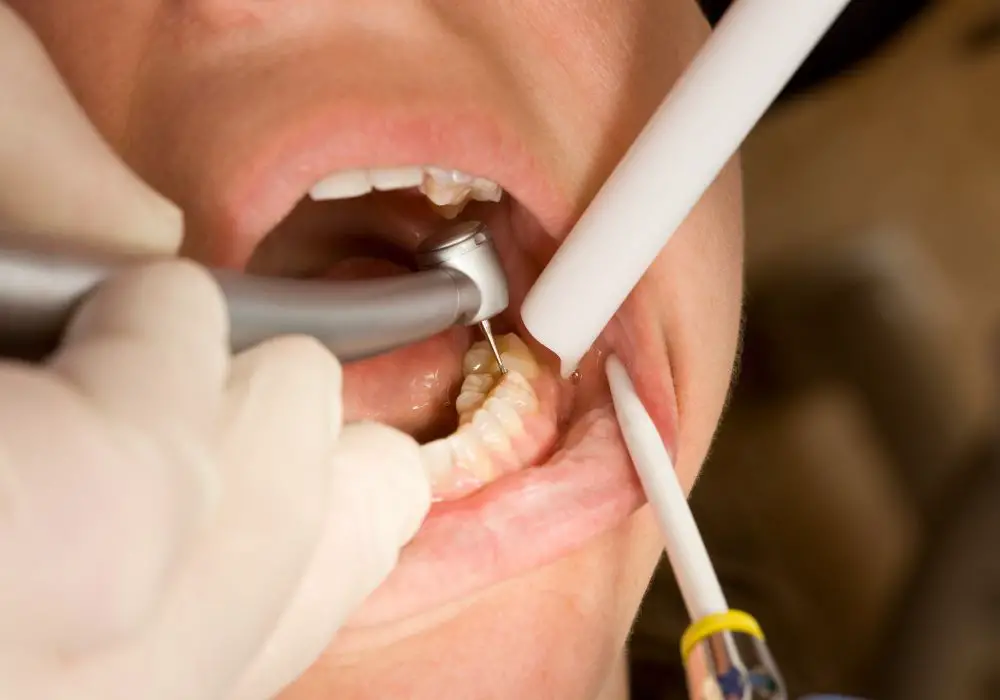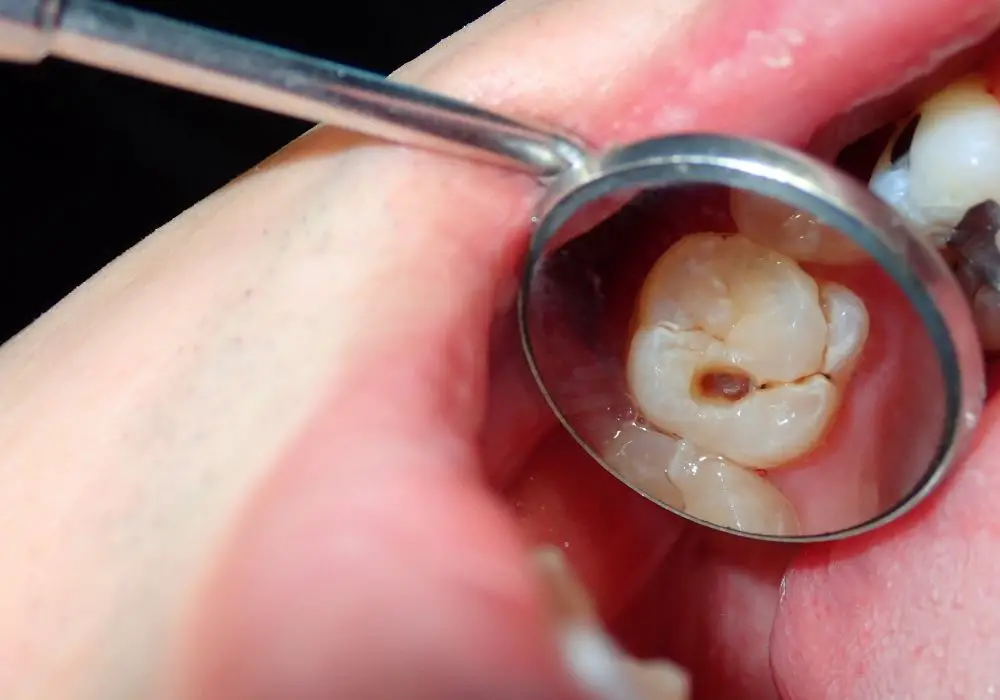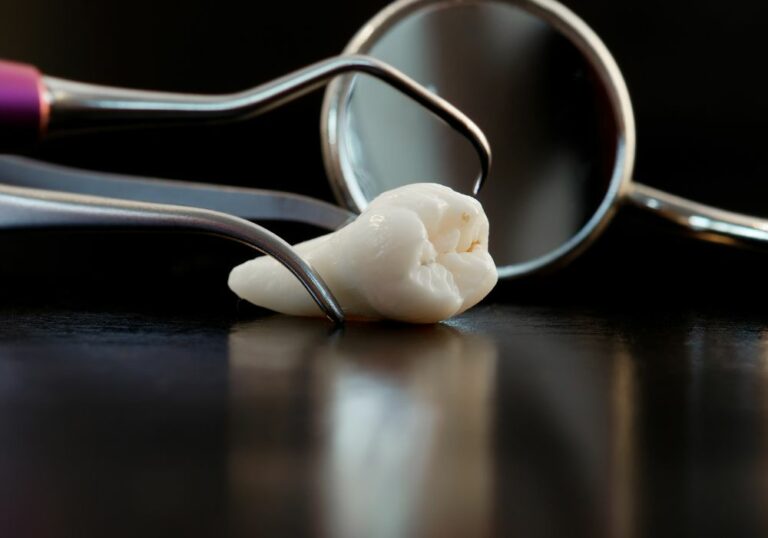If you’ve ever had a cavity, you know how unpleasant they can be. Cavities can cause pain, sensitivity, and even lead to tooth loss if left untreated. But how long can you have a cavity before your tooth falls out? The answer is not straightforward, as it depends on various factors.
One of the most significant factors that determine how long you can have a cavity before your tooth falls out is the severity of the cavity. If the cavity is in its early stages, you may not even notice any symptoms. However, as the cavity progresses, you may experience pain, sensitivity, and discoloration. If left untreated, the cavity can eventually reach the pulp of your tooth, leading to infection, abscess, and even tooth loss.
Understanding Cavities

What Are Cavities?
Cavities are permanently damaged areas in the hard surface of your teeth that develop into tiny openings or holes. Cavities, also called tooth decay or caries, are caused by a combination of factors, including bacteria in your mouth, frequent snacking, sipping sugary drinks, and not cleaning your teeth well.
When you eat sugary or starchy foods, the bacteria in your mouth produce acid that attacks your tooth enamel. Over time, this acid can break down your tooth enamel and create small holes in your teeth. If left untreated, cavities can lead to more serious dental problems, such as infections and tooth loss.
Causes of Cavities
Several factors can contribute to the development of cavities. These include:
- Poor oral hygiene: Not brushing and flossing your teeth regularly can leave food particles and plaque on your teeth, which can lead to cavities.
- High sugar intake: Eating a diet high in sugar and carbohydrates can increase the amount of acid in your mouth, which can cause tooth decay.
- Dry mouth: Saliva helps to neutralize acid in your mouth and wash away food particles. If you have a dry mouth, you may be at a higher risk of developing cavities.
- Acid reflux: Acid reflux can cause stomach acid to flow into your mouth, which can erode your tooth enamel and lead to cavities.
- Genetics: Some people may be more prone to cavities due to their genetics.
To prevent cavities, it’s important to practice good oral hygiene, limit your sugar intake, and visit your dentist regularly for checkups and cleanings.
The Progression of Cavities
If you’re wondering how long you can have a cavity before your tooth falls out, it’s important to understand the progression of cavities. Cavities are caused by tooth decay, which is a process that can take months or even years to develop. Here are the stages of cavity progression:
Initial Stage
During the initial stage of cavity development, you may not experience any symptoms. This is when bacteria in your mouth begin to produce acid that can erode your tooth enamel. At this stage, the damage is reversible, and you can prevent further decay by brushing and flossing regularly and using fluoride toothpaste.
Enamel Decay
If the decay progresses beyond the enamel, you may start to notice symptoms such as tooth sensitivity or pain when eating or drinking hot, cold, or sweet foods and beverages. At this stage, the cavity has reached the dentin, which is the layer of the tooth beneath the enamel. Treatment options at this stage include fillings or dental crowns, depending on the extent of the decay.
Dentin Decay
If left untreated, the cavity will continue to progress and reach the pulp, which is the innermost layer of the tooth that contains nerves and blood vessels. This can cause severe pain and sensitivity, and you may notice swelling or pus around the affected tooth. At this stage, root canal therapy may be necessary to remove the infected pulp and save the tooth.
Pulp Infection
If the infection is left untreated, it can spread to the surrounding tissues and cause an abscess. This can lead to more severe symptoms such as fever, facial swelling, and difficulty swallowing or breathing. In some cases, the tooth may need to be extracted to prevent the infection from spreading further.
In summary, the progression of cavities can take months or even years, and it’s important to catch and treat them early to prevent further damage to your teeth. Regular dental check-ups and good oral hygiene habits can help prevent cavities from developing in the first place.
Impact of Untreated Cavities

If left untreated, cavities can have serious consequences for your oral and overall health. Here are some of the potential impacts of untreated cavities:
Tooth Loss
Untreated cavities can eventually lead to tooth loss. As the decay progresses, it can reach the inner layers of the tooth, including the pulp and nerves. This can cause pain, sensitivity, and infection. In some cases, the tooth may need to be extracted to prevent the infection from spreading.
Other Health Complications
Untreated cavities can also lead to other health complications, including:
- Abscesses: An abscess is a pocket of pus that forms at the root of the tooth. This can cause swelling, pain, and fever. If left untreated, the infection can spread to other parts of the body.
- Gum disease: Cavities can also lead to gum disease, which can cause inflammation, bleeding, and eventually tooth loss.
- Heart disease: Some studies have suggested a link between gum disease and heart disease. While the exact relationship is not fully understood, it is believed that the bacteria from gum disease can enter the bloodstream and contribute to the development of heart disease.
- Diabetes: People with diabetes are more prone to gum disease and other oral health problems. Untreated cavities can make it more difficult to manage blood sugar levels and can contribute to other diabetes-related complications.
Overall, it is important to address cavities as soon as possible to prevent these potential health complications. Regular dental check-ups and good oral hygiene habits can help prevent cavities from forming in the first place.
Prevention and Treatment of Cavities
Dental Hygiene Practices
Practicing good dental hygiene is key to preventing cavities. Brush your teeth at least twice a day with fluoride toothpaste. Make sure to brush all surfaces of your teeth, including the front, back, and chewing surfaces. Floss at least once a day to remove plaque and food particles from between your teeth. You can also use an antiseptic mouthwash to kill bacteria that cause cavities.
Regular Dental Check-Ups
Regular dental check-ups are essential for maintaining good oral health. Your dentist can detect cavities early on and treat them before they become more serious. During a dental exam, your dentist will examine your teeth, gums, and mouth for any signs of decay or other problems. X-rays may also be taken to check for cavities in between teeth.
Dental Procedures
If you have a cavity, your dentist will recommend the appropriate treatment based on the severity of the decay. For minor cavities, a filling may be all that is needed. If the cavity is more severe, a crown or root canal may be necessary. In some cases, the tooth may need to be extracted if it cannot be saved.
To prevent cavities from developing, your dentist may recommend dental sealants. Sealants are a thin, protective coating that is applied to the chewing surfaces of the back teeth. They can help prevent food particles and bacteria from getting stuck in the grooves of your teeth and causing decay.
In addition to these preventative measures, it’s important to maintain a healthy diet and limit sugary and acidic foods and drinks. By following these dental hygiene practices and regularly visiting your dentist, you can help prevent cavities and maintain good oral health.
Frequently Asked Questions
How to know if a cavity has reached the nerve?
If you experience tooth sensitivity or pain when eating or drinking hot, cold, sweet, or acidic foods and drinks, it may indicate that a cavity has reached the nerve. You should visit your dentist as soon as possible to get a proper diagnosis and treatment.
Can I wait 6 months to fill a cavity?
It is not recommended to wait 6 months to fill a cavity. Cavities can progress and become more severe over time, leading to more extensive and expensive treatments. It is best to get a cavity filled as soon as possible to prevent further damage to your tooth.
How long can you wait for a cavity?
You should not wait too long to get a cavity treated. The longer you wait, the more extensive the damage can become, and the more invasive the treatment may need to be. It is best to get a cavity filled as soon as possible to prevent further damage to your tooth.
How long do cavity fillings last?
The lifespan of a cavity filling depends on several factors, including the type of filling material used, the size and location of the cavity, and how well you take care of your teeth. On average, cavity fillings can last anywhere from 5 to 15 years. It is important to maintain good oral hygiene and visit your dentist regularly to ensure the longevity of your fillings.
Can a cavity go away with brushing?
Unfortunately, brushing alone cannot make a cavity go away. Once a cavity has formed, it cannot be reversed. However, brushing and flossing regularly can help prevent cavities from forming in the first place and stop them from getting worse.
What happens if you wait too long with a cavity?
If you wait too long to get a cavity treated, the decay can progress and reach the nerve of your tooth, causing pain, infection, and even tooth loss. In severe cases, you may require a root canal or tooth extraction. It is best to get a cavity filled as soon as possible to prevent further damage to your tooth.






